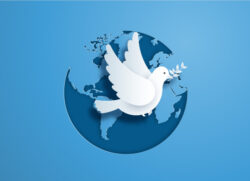Reflection on Humanitarianism Through the Experience of Oskar Schindler and Albert Schweitzer

By Amanda Dawnrich
Early one blustery November day in 2012 was the very first day I had a connection with the idea of humanitarianism. After eight years of daily personal growth studies as a hobbyist on World War II and the Holocaust, I was finally in Kraków Poland, standing in front of Oskar Schindler’s original machine factory- a business used as a decoy to protect Polish Jews during World War II from deportation to nearby Auschwitz concentration camp. Filled with despair and in dire need of protection, approximately 1,100 Polish Jews lives were saved by the humanitarian efforts of German Catholic Nazi party member, Oskar Schindler. Always intrigued and concerned about populations that experience and live amidst oppression, it was not until recently where the connection between Schindler and Albert Schweitzer truly struck me.
With a strong mission of implementing humanitarian ideals as Albert Schweitzer did in his experiences around the world and especially Lambarene, West Africa, I purposefully intervened with my project population – justice involving women in residential care. The Coronavirus has impacted humanity, as well as the way that services are currently being delivered for mental and physical healthcare. In lieu of spending breathless time configuring a program I presumed would suit the needs of my population, I simply listened before I intervened.
As a community trained social work candidate, I concentrated on the wants and needs of each individual woman, what specific services could help them feel both mentally and physically satisfied in their lives, neighborhoods, and communities. When appropriate, I inquired, asking open-ended questions about their wishes, hopes, dreams, and any barriers that make physical and mental health goals difficult to achieve. I became enthralled to experience such engagement from the residents, even at the expense of the looming concerns of the privilege I hold as a middle-class White American, the importance of acknowledging this, and other issues surrounding program interventions during a pandemic.
When I set out on this journey of discovering and learning about Albert Schweitzer and implementing my NUTRICO cooking and nutrition program, I never purported on a connection between my own history of learning about humanitarian ideals by studying Schindler and other heroes of the Holocaust. Being educated, being observant, being open to take in and persevere what being a humanitarian truly means ignited my past efforts and endeavors during my travels to a new level, current day speaking. The opportunity to participate in the Albert Schweitzer Fellowship spawned a new era of what I have held deep inside of me: Thinking and acting as a humanitarian – a new humanitarian, were aspirations rooted deeply inside of myself back in the early 2000s when I began studying about World War II.
In Schindler’s autobiography he said himself, “Far from being a saint, I have, as a reckless human being, made more mistakes and am more flawed than those who walk through life with supposedly unblemished morals. But because of this I was able to maintain and defend what Albert Schweitzer called ‘regard for the human being.’ After 10 years, although the ink on my large back tattoo is well faded and difficult to understand to the average passerby, a little red bird (representative of the only piece of the move Schindler’s List in color, the girl in the red coat) still sits in her cage, accompanying my barely legible famous Oskar Schindler movie quote “To save one life is to save the world entire.” Little did I know then how a hobbyist study of World War II and Oskar Schindler would be the beginning of something as lifechanging as experiencing a full “360” with the honor of being an Albert Schweitzer Fellow.
Amanda Dawnrich is a Wayne State University School of Social Work student and 2022-23 Albert Schweitzer Fellow. For World Humanitarian Day, 2022.
REFERENCES
Remember Them: Champions for Humanity. (n.d.). Retrieved 2022, from https://www.remember-them.org/schindler.htm
Schweitzer, A., Campion, C. T., Kaplan, M. S., & Skillings, E. (1950). Out of my life and thought: An Autobiography. New York: H. Holt and.
United States Holocaust Memorial Museum. (n.d.). Retrieved 2022, from https://www.ushmm.org/collections/bibliography/oskar-schindler
